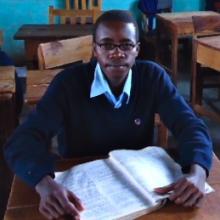
Seventeen-year-old Felix Kimathi is an aspiring journalist who visited Drummond in 2011 as part of the Drummond–Kenya Partnership scheme. In this, the second piece he has written for us (see Issue 204), he talks about life after school, and reveals that – in a period of economic hardship – there are surprising similarities between the experiences of disadvantaged young people in both the developed and developing worlds.
Life is really hard after school.
No jobs for leavers: they are called inexperienced and denied chances to work. What is left for them is being a casual labourer in industries at a very low pay. If there is a good job, it will be given to folks from wealthy families after bribing. You might be a very qualified graduate from a college or a university but lack a job.
After life being extra cruel to them, many leaves turn to being thieves and others drug pedlars. This makes many youths lose hope in life and makes them indulge themselves in dirty businesses which are readily available.
My situation is this – I am employed by a non-governmental organisation (NGO) at 2500ksh (about £19.34) on a short-term contract which will expire on 31 March. The pay is not even enough to cater for my needs, but it is better a half penny than none.
Getting a job needs a good arrangement, and a good and honorable person to talk on your behalf.